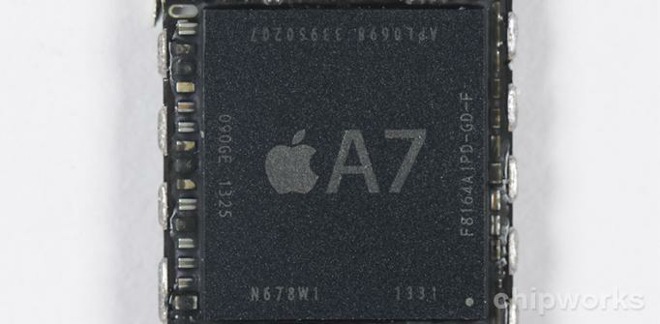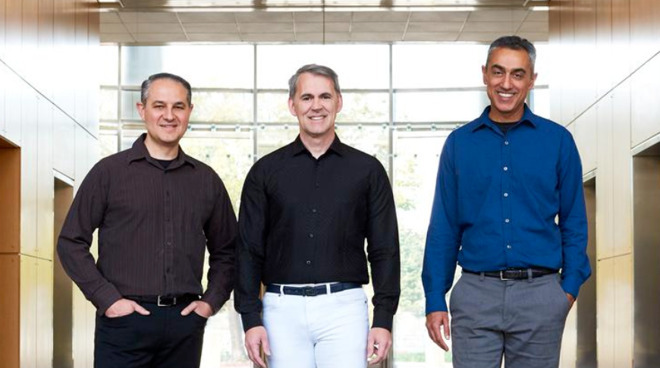Apple suing former iPhone chip designer for breach of contract
Former iPhone processor designer Gerard Williams III, who left to form his own chip development firm Nuvia, is being sued by Apple for breaking employment agreements.

Apple's A7 SoC debuted as the world's first 64-bit mobile processor and was one of the chips that Gerard Williams III worked on.
Apple is suing Gerard Williams III, former iPhone and iPad processor designer, for breach of contract. The suit asserts that Williams began his new company, Nuvia, while still working for Apple, and also accuses him of recruiting his former colleagues.
"The case involves a worst-case scenario for an innovative company like Apple," says the suit, filed in the Santa Clara Superior Court. "A senior director with years of experience, and years of access to Apple's most valuable information, starts a competing company leveraging the very technology the director was working on, and the same teams he was working with, while still employed by Apple."
"Apple does not take this matter lightly," it continues. "Apple does not litigate with past employees regularly. Here, however, Williams's actions, in competing with Apple while at the same time working for Apple, jeopardize years of hard work by hundreds of people, and millions of dollars invested."
The specific claims in the suit include that "by 2018, Williams had started his new venture on Apple's dime." Apple says Williams told colleagues his new firm would develop technology that Apple "would have no choice but to purchase."
Apple also alleges that Williams "attempted a cover-up" while at the company. He reportedly took steps to avoid "written communications that he thought Apple could find."
Rather than emails, he allegedly phoned potential recruits or got his Nuvia colleagues to contact them on his behalf.
However, Williams has filed a counterargument, a "notice of demurrer" in the same court. The document refers to multiple sections of Apple's suit which Williams seeks to have striken.

Nuvia co-founders, L-R: John Bruno, Gerard Williams III, and Manu Gulati
Overall, his rebuttal centers on how, Williams asserts, Apple has no legal right to sue him. He argues that the anti-competitive clauses in his contract were against state legislature.
"Apple cannot state a claim for breach of contract because the underlying contractual provision is illegal," Williams says in his court filing. "Apple cannot state a claim for breach of the duty of loyalty because it is preempted by the California Uniform Trade Secrets Act..."
Willliams also asserts that Apple has used private text messages between him and colleagues.
"To further intimidate any current Apple employee who might dare consider leaving Apple," the demurrer document continues, "Apple's Complaint shows that it is monitoring and examining its employees' phone records and text messages, in a stunning and disquieting invasion of privacy."
According to The Register, which first reported the story, Williams's arguments amount to how state laws mean he was legally allowed to plan and recruit for his Nuvia company while still working for Apple.
Gerard Williams left Apple in February 2019 after nine years of service, having previously worked at ARM.
At the time, it was reported that he had not yet taken up a role at another company. However, it was revealed in November 2019 that he had been working to form a new company called Nuvia with the aim of designing processors specifically for heavy-use data centers.
Williams's Nuvia company is co-founded by him with two other ex-Apple employees, Manu Gulati, and John Bruno.
Bruno and Gulati had both already left Apple to join Google before NuVia was started. Bruno previously worked in Apple's platform architecture group. Gulati was involved in mobile System on a Chip development at Apple for eight years until 2017.
Neither Apple nor Nuvia has commented publicly on the case. A hearing is currently scheduled to take place on January 21, 2020.

Apple's A7 SoC debuted as the world's first 64-bit mobile processor and was one of the chips that Gerard Williams III worked on.
Apple is suing Gerard Williams III, former iPhone and iPad processor designer, for breach of contract. The suit asserts that Williams began his new company, Nuvia, while still working for Apple, and also accuses him of recruiting his former colleagues.
"The case involves a worst-case scenario for an innovative company like Apple," says the suit, filed in the Santa Clara Superior Court. "A senior director with years of experience, and years of access to Apple's most valuable information, starts a competing company leveraging the very technology the director was working on, and the same teams he was working with, while still employed by Apple."
"Apple does not take this matter lightly," it continues. "Apple does not litigate with past employees regularly. Here, however, Williams's actions, in competing with Apple while at the same time working for Apple, jeopardize years of hard work by hundreds of people, and millions of dollars invested."
The specific claims in the suit include that "by 2018, Williams had started his new venture on Apple's dime." Apple says Williams told colleagues his new firm would develop technology that Apple "would have no choice but to purchase."
Apple also alleges that Williams "attempted a cover-up" while at the company. He reportedly took steps to avoid "written communications that he thought Apple could find."
Rather than emails, he allegedly phoned potential recruits or got his Nuvia colleagues to contact them on his behalf.
However, Williams has filed a counterargument, a "notice of demurrer" in the same court. The document refers to multiple sections of Apple's suit which Williams seeks to have striken.

Nuvia co-founders, L-R: John Bruno, Gerard Williams III, and Manu Gulati
Overall, his rebuttal centers on how, Williams asserts, Apple has no legal right to sue him. He argues that the anti-competitive clauses in his contract were against state legislature.
"Apple cannot state a claim for breach of contract because the underlying contractual provision is illegal," Williams says in his court filing. "Apple cannot state a claim for breach of the duty of loyalty because it is preempted by the California Uniform Trade Secrets Act..."
Willliams also asserts that Apple has used private text messages between him and colleagues.
"To further intimidate any current Apple employee who might dare consider leaving Apple," the demurrer document continues, "Apple's Complaint shows that it is monitoring and examining its employees' phone records and text messages, in a stunning and disquieting invasion of privacy."
According to The Register, which first reported the story, Williams's arguments amount to how state laws mean he was legally allowed to plan and recruit for his Nuvia company while still working for Apple.
Gerard Williams left Apple in February 2019 after nine years of service, having previously worked at ARM.
At the time, it was reported that he had not yet taken up a role at another company. However, it was revealed in November 2019 that he had been working to form a new company called Nuvia with the aim of designing processors specifically for heavy-use data centers.
Williams's Nuvia company is co-founded by him with two other ex-Apple employees, Manu Gulati, and John Bruno.
Bruno and Gulati had both already left Apple to join Google before NuVia was started. Bruno previously worked in Apple's platform architecture group. Gulati was involved in mobile System on a Chip development at Apple for eight years until 2017.
Neither Apple nor Nuvia has commented publicly on the case. A hearing is currently scheduled to take place on January 21, 2020.

Comments
It is true that in California your employer cannot prevent you from working on outside projects even if they compete with the companies products. They are also able to recruit colleagues. However, that activity must be outside working hours and not utilize company resources or IP. In one of the cases the company discovered the business plan for the startup was written using a company computer during business hours. And then they discovered a receipt for copy of one of the recruited engineer's engineering notebook dated the day before he quit. The startup had to pay hundreds of millions in damages and went out of business.
In short, the devil is in the details. There are California laws that protect startup founders but they're not a get out of jail free card.
As far as quitting before starting his own venture? Nah, that doesn't make sense. I am pretty sure that most of us have gone on job interviews while being employed. We didn't quit and start our search. We got our ducks in a row, just like Williams. As @dewme pointed out, companies can release employees at any time, regardless of how it would affect the employee.
According to the article, his company isn't competing with Apple -a new company called Nuvia with the aim of designing processors specifically for heavy-use data centers- so I really don't see the problem.